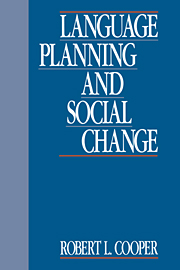Book contents
4 - Some descriptive frameworks
Published online by Cambridge University Press: 06 January 2010
Summary
Descriptive frameworks are molds wherein behavior may be poured to cool and harden for analysis. The same behavior, poured into different molds, takes on different shapes. Thus a political scientist's, sociologist's, and curriculum specialist's account of the Ethiopian mass-literacy campaign will differ substantially one from the other. Each analyst, interested in different aspects of the same behavior, employs that framework which facilitates concentration on the features of interest.
While behavior may be divisible for purposes of analysis, it is nonetheless unitary. Just as different independent variables may be combined via multiple regression analysis to “account for” variation in a given outcome, so can the insights obtained from different disciplines be combined to account for a particular phenomenon overall. Inasmuch as there is yet no generally accepted framework for the study of language planning, it may be useful to look at frameworks suggested by other disciplines or subdisciplines not only to understand language planning better but also to forward the development of a framework particularly suited for language planning. Accordingly, we turn to frameworks suggested for the diffusion of innovation, marketing, politics, and decision making and apply them to language planning. Thus I will consider language planning as, in turn, (1) the management of innovation, (2) an instance of marketing, (3) a tool in the acquisition and maintenance of power, and (4) an instance of decision making. Finally I present a second version of the framework for the study of language planning suggested in the previous chapter, modified and elaborated on the basis of the four frameworks presented here.
- Type
- Chapter
- Information
- Language Planning and Social Change , pp. 58 - 98Publisher: Cambridge University PressPrint publication year: 1990



